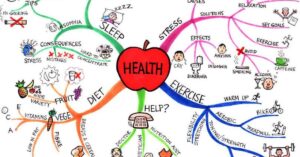Losing weight is a goal for many people. It can help improve health and boost energy levels. However, weight loss can feel overwhelming, especially with so much advice out there. The good news is that small changes in your routine can lead to big results over time. With the right approach, weight loss is possible for anyone.
There are different ways to lose weight. Some methods focus on diet, while others emphasize exercise. It’s important to find a plan that works for you and fits your lifestyle. Healthy eating, regular physical activity, and getting enough sleep are key factors in losing weight. Consistency is the most important part of any weight loss journey.
In this article, we will discuss 10 ways to lose weight. These tips are simple, easy to follow, and can be done at your own pace. Whether you’re just starting or looking for new ideas, these strategies can help you achieve your weight loss goals.
Here are 10 simple ways to help you lose weight

Here are 10 easy tips to help you lose weight: drink more water, eat smaller portions, choose healthy snacks, avoid sugary drinks, get enough sleep, stay active, eat more fruits and vegetables, limit junk food, plan your meals, and don’t skip breakfast. Small changes like these can make a big difference!
Eat More Vegetables
Vegetables are low in calories and high in nutrients. They fill you up without adding too many calories to your diet.
Try to add vegetables to every meal. They can be eaten raw, cooked, or even blended into smoothies.
Drink Water Before Meals
Drinking water before eating helps you feel full, so you eat less. It’s an easy way to control portion sizes.
Try drinking a glass of water 30 minutes before each meal. This can help you avoid overeating.
Exercise Regularly
Exercise burns calories and helps you stay healthy. Aim for at least 30 minutes of activity most days of the week.
You don’t have to go to the gym—walking, cycling, or dancing can be fun ways to stay active.
Avoid Sugary Drinks
Sugary drinks like soda and sweetened tea can add many empty calories. These drinks don’t make you feel full and can lead to weight gain.
Switch to water, herbal teas, or unsweetened drinks to cut back on sugar and calories.
Get Enough Sleep
Not getting enough sleep can mess with your hunger hormones. When you’re tired, you’re more likely to crave unhealthy foods.
Aim for 7-9 hours of sleep each night to support your weight loss goals.
Eat More Protein
Protein helps you feel full longer, so you eat less overall. It also helps build muscle, which can boost your metabolism.
Add lean meats, eggs, beans, and nuts to your diet to get more protein.
Control Your Portions
Portion sizes at restaurants or at home can be larger than you need. Eating smaller portions can help you reduce your calorie intake.
Use smaller plates and be mindful of how much food you’re putting on your plate.
Limit Processed Foods
Processed foods are often high in unhealthy fats, sugar, and salt. These foods can make it harder to lose weight.
Try to eat whole foods like fruits, vegetables, and whole grains instead of packaged snacks and fast food.
Stay Consistent
Consistency is key when it comes to weight loss. It’s important to stick to your healthy habits every day.
Even if you slip up once in a while, don’t give up. Keep going and stay focused on your long-term goals.
Keep Track of Your Progress
Tracking what you eat and your exercise can help you stay on track. It makes it easier to see your progress and identify areas where you can improve.
Use an app or a journal to keep track of your meals, workouts, and any changes in your weight
How Much Time Does It Really Take to Follow a Diet Plan for weight loss?
Starting a diet plan takes time, but it doesn’t have to be complicated. Preparing meals, grocery shopping, and learning about healthy foods are small steps that help you stay on track. At first, it might feel like it takes a lot of effort, but it gets easier with practice.
On average, following a diet plan can take 1-2 hours a day. This includes cooking, planning meals, and eating mindfully. Some people spend more time if they enjoy meal prep, while others stick to quick and simple options. The key is to find a routine that works for you.
The time you invest in your diet plan is worth it. It improves your health and helps you feel better. With consistency, it becomes a natural part of your day, saving time and stress in the long run.
How Much Time Is Required for Long-Term Diet Success for weight loss?
Achieving long-term diet success takes time, but it’s not about quick fixes. Small, daily changes build up over weeks and months. Things like eating healthier meals and staying active can become habits with consistency.
The time needed depends on your goals and lifestyle. For most people, it’s not about spending hours but making better choices each day. Simple actions like meal planning or mindful eating take just minutes but make a big difference.
Patience is key for long-term success. Focus on steady progress rather than rushing results. Over time, the effort you put in will lead to lasting changes and a healthier life.
Conclusion
Losing weight doesn’t have to be complicated. By making small changes like eating healthier, staying active, and drinking more water, you can see progress over time. Each step you take brings you closer to your goals.Remember, consistency is the key. Stick to these simple habits, and be patient with yourself. Weight loss is a journey, and every little effort adds up to big results in the end.
FAQ’s
What is the most important step for weight loss?
The most important step is consistency. Small, healthy changes every day lead to long-term results.
How much exercise is needed to lose weight?
Aim for at least 30 minutes of moderate activity, like walking, 5 days a week to see results.
Can I lose weight without giving up my favorite foods?
Yes, balance is key! Enjoy your favorite foods in moderation while focusing on overall healthy choices.
Is it necessary to count calories?
Not always, but being aware of portion sizes and food choices can help control calorie intake.
How long does it take to see weight loss results?
Results vary, but you may notice changes within a few weeks with consistent effort and healthy habits.
Guest Blogger and Content Writer










